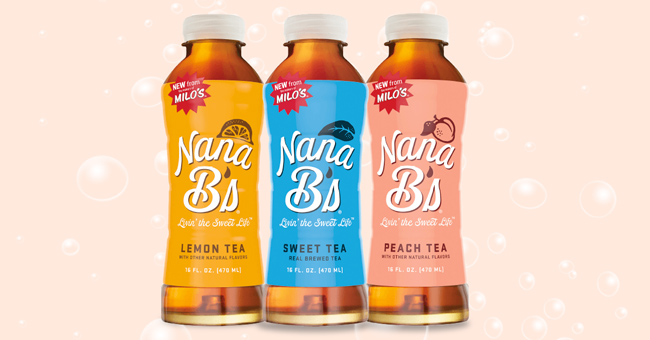
Alabama-based Milo’s Tea Company has quietly become the fourth largest iced tea maker in the U.S. It’s taken a long time, but since being spun off as an independent company in 2002, the 75-year old family owned business has steadily been building new production capacity investing in the brand and incrementally expanding its target consumer base out of the regional south.
Southerners are most likely familiar with the simple labels of Milo’s sweet tea. The color-coordinated products delineate between the different flavors of tea, lemonade and low-to-no-sweetened offerings. Yet, the brand has been positioning itself recently beyond the coolers of its Alabama roots and is now making a play for category leaders like Pepsi’s Lipton and AriZona Iced Tea. In recent promotional materials, Milo’s touted itself as the #1 refrigerated tea brand in the U.S. for the past 72 weeks, citing Nielsen xAOC+convenience data through the week of July 16.
Milo’s is now available at about 41,800 stores across the U.S., according to the company. According to the most recent Goldman Sachs Equity Research Report of NielsenIQ data, dollar sales for the sweet tea maker reached $406 million in the 52-week period ending September 20. The company’s sales were up 102.1% with volumes increasing 87.3% in the 52-week period. In fact, Milo’s isn’t just the top refrigerated tea brand in the country; recent data from IRI (past 52 weeks ending August 7) showed it to be bigger than both Starbucks and GTs, the leaders in their respective refrigerated categories as well.
Milo’s made significant gains in the market even amidst the supply chain woes of the pandemic, the result of in-house production that allowed it to continue to manufacture as other facilities faltered.
“We spent 2020 prioritizing the safety of our associates and our consumers, the result of which is that we were able to keep Milo’s stocked on retailers’ shelves when our competitors could not,” said Tricia Wallwork, CEO and granddaughter of founders Milo and Bea Carlton, in response to written questions. “Along with commitment to people, our product speaks for itself—simple, all-natural ingredients make for consistent taste and quality that evolves consumers into passionate fans.”
This simplicity is part of the brand’s continued success. The company began as a restaurant founded in Birmingham by husband-wife team Milo and Bea after Milo returned from combat in World War II. By 1989, the Carltons had realized the success of their sweet tea at the hamburger restaurant locations and began making and selling the product in local retailers. The spin-off business was so successful, the Carlton family sold the Milo’s restaurant franchise in 2002 and put all its attention on the tea brand.
Since that time, Milo’s has expanded to offer lemonade and a range of flavored, unsweetened and zero-calorie teas. Last summer the company launched a new product line, Nana B’s Tea, which includes 16 oz. bottles of Sweet, Lemon and Peach tea.

In 2020, Milo’s spent a reported $60 million to build a second production facility in Tulsa, Oklahoma and proceeded to invest another $20 million the following year to expand the existing 105,000-square-foot facility by another 3,000 sq. feet; the company is also planning another $100 million expansion of its existing facility near Birmingham.
Wallwork, a corporate lawyer, joined the family business as corporate counsel in 2004 and was named CEO in 2012. It boasts a 1% Profit Pledge that benefits community nonprofits. Milo’s is also a certified Women Owned business and a zero-waste manufacturer by third-party certification organization TRUE.
The company is committed to offering a “living wage,” covering 100% of health care and added 40% more associates in 2021, Wallwork said during a Consumer Brands Association webinar in 2021. “Through our People First culture we’ve empowered our associates to be self-led, engaged and focus on results, which translates into better equipment efficiency.”
As revenue has increased, Milo’s has brought on new hires to help the company continue scaling. CPG beverage veteran Olga Biletska was named as sales director last December. Previously, Biletska worked in sales management positions for Starbucks and Teavana. Milo’s also hired Andrew Green as a strategic investments manager around the same time, and has also filled executive positions in brand management, innovation and marketing in the last two years.

The company also appears to be investing in analytics. According to LinkedIn, there are positions open for a data scientist, data/analytics manager and product developer, among other roles.
While Milo’s growth has been quiet, the company made a national splash last summer when it invested marketing dollars in another well-known product revered in the Deep South, college football.
On July 1, 2021, soon after the National Collegiate Athletic Association (NCAA) changed its rules to allow college athletes to be sponsored for their “name, image and likeness” (NIL), Milo’s reached a deal with Birmingham-native and then-Auburn University quarterback Bo Nix. In a savvy play for both sides of the big school divide in Alabama, the company followed the Nix announcement the next day with a similar deal for Auburn rival Alabama University’s defensive back Malachi Moore.
While ESG and NIL are modern catchphrases for Milo’s sponsorships and initiatives, Wallwork said the company considers something more old-school to be its core advantage in today’s beverage business: its long-term family ownership.
“Milo’s is a proud third generation, family-owned business with no outside investment,” she told BevNET. “Staying family owned allows us to spend time thinking about purposeful profit not only for today but for generations to come.”